#goddess hybris
Explore tagged Tumblr posts
Text
first tumblr post gulp.. obvi i had to make it my girl hybris 😼😼 (she’s the greek personification/goddess of hubris, insolence, deadly pride & arrogance) ((the stripes represent the ppl that 😵 to hubris))

alternate and close-ups below bc i love her eye specifically 💕



very much used a ref for this i am not this good at anatomy guys..
i like how she’s labelled as the cause of death for so many ppl in greek myths but NO ONE knows abt her 😭🙏🙏
#greek mythology#hybris#goddess hybris#greek gods#greek myth art#digital art#the illiad#idk#it’s filled with enough hubristic men#pov ur name is odysseus#pov u breathed in ancient greece#ppl should talk abt her more
6 notes
·
View notes
Text
It took longer than I thought, but here she is as requested😊 Goddess Hybris!

56 notes
·
View notes
Text
Apparently Zeus Isn't the Biggest Whore...
I made a Top 3 Malewhores from Greek Mythology out of curiosity, and apparently Zeus isn't the first one.
3rd Place: Apollo! 🥉
Bodycount: 52
Goddesses (4)
Hecate
Calliope
Urania
Thalia
Nymphs (15)
Aethusa
Acacallis
Chrysothemis
Corycia
Cyrene
Leuconoe
Melaena
Melia
Ocyrrhoe
Othreis
Urea
Rhetia
Sinope (depending on the myth version)
Stilbe
Syllis
Mortal Women (24)
Acalle or Acacallis
Amphissa
Euboia
Aria
Deione
Arsinoe
Dryope
Evadne
Erginos
Hecuba
Hyria
Celaeno
Chione
Coronis
Creusa
Cyrene
Leucippus' wife
Manto
Parthenope
Phthia
Procleia
Psamathe
Thero
Thyia
Male Lovers (9)
Hyacinthus
Hymenaeus
Cyparissus
Adonis
Admetus
Branchus
Helenus
Hyppolytus
Phorbas
2nd Place: Zeus! 🥈
Bodycount: 56
Goddesses (16)
Aphrodite
Demeter
Dione (unless Aphrodite is motherless)
Eurynome
Gaia
Hera
Hybris (depending on the myth versions)
Calliope
Leto
Metis
Mnemosyne
Nemesis
Persephone (again, depending on the myth versions)
Selene
Styx (when she's the mother of Persephone)
Themis
Nymphs (18)
Aegina
Aix
Borysthenes' daughter
Deino
Electra
Himalia
Hora
Io
Callirhoe
Carme
Maia
Nymphe African
Nymphe Sithnis
Nymphe Samothrakian
Othreis
Plouto
Taygete
Thalia
Mortal Women (21)
Alcmene
Antiope
Danae
Dia
Elara
Europa
Eurymedusa
Callisto
Calyce
Cassiopea
Lamia
Laodameia
Leda
Lysithoe
Niobe
Olympias (Yes, mother of Alexander of Great!)
Pandora
Pyrrha
Phthia
Semele
Thyia
Male Lovers (1)
Ganymede
1st Place: Poseidon! 🥇
Bodycount: 73
Goddesses (5)
Amphitrite
Aphrodite
Demeter
Gaia
Circe
Nymphs (26)
Alcyone
Anippe
Arethusa
Ascra
Beroe
Eidothea
Euryte
Celaeno
Celusa
Chione 1
Chione 2
Cleodora
Corcyra
Diopatra
Medusa (I know she's a gorgon but this is the closest category she could've been included in)
Melantheia
Melia
Mideia
Nymphe Khias
Nymphe Tarentine
Peirene
Pero
Pitane
Salamis
Thoosa
Tritonis
Mortal Women (40)
Agamede
Aethra
Alope
Althaea
Amphikriton's daughter
Amymone
Anippe
Arene
Arne or Antiope
Astydameia
Astypalaea
Europa (not that Europa, another one; now I'm starting to believe that Poseidon tries to copy Zeus...)
Euryale
Eurycyda
Eurynome
Helle
Hyppothoe
Iphimedeia
Caenis
Calyce
Canace
Celaeno
Chalcinia
Chrysogeneia
Cleito
Larissa
Leis
Lena
Libya
Lysianassa
Mecionice
Melantho
Mestra
Molione
Oenope
The wife of Prince Ornytion
Periboea
Themisto
Theophane
Tyro
Male Lovers (2)
Nerites
Pelops
#greek mythology#poseidon#greek gods#apollo#zeus#this was made purely for the sake of curiosity#and yes I actually wasted my time writing this#what the hell am I doing with my life?
256 notes
·
View notes
Text
Okay, so for my own fanfictions, most of which take place post-TOA and therefore post-Percy "claim your children" Jackson and Jason "honor minor gods" Grace, I made myself a spreadsheet of all the cabins I believe could plausibly be at Camp Half-Blood, and ended up with a whopping 270, and there's probably more dieties whom I couldn't find any information on, and some dieties whom I don't believe would have a cabin (ex. Kronos) (if you think I should add someone comment) and decided to paste it here, since I don't feel comfortable sharing my original spreadsheet. I did add the water dieties, even though their kids could also plausibly go to the underwater camp, but I've decided to give them the option of what camp they want. I also didn't copy their domains, but I have the list from my research, so you can ask if you'd like, I'll be glad to explain! Most of my research was from Theoi Project - Greek Mythology, and Brittanica, and probably some others I've since forgotten, so if you know any good Greek Mythology resourses and books, please share!
Here's some symbols before we begin:
* - virgin goddess. I added them because Athena and Artemis already have cabins (and Athena kids by magical means)
" - Dieties whom have faded in the series. Their cabins are more memorials to them.
Additionally there are 2 dieties named Thalia, (1) Thalia refers to the muse, the goddess of comedies, and (2) Thalia refers to the goddess of festivities and banquet
Zeus
Hera
Poseidon
Demeter
Ares
Athena*
Apollo
Artemis*
Hephestus
Aphrodite
Hermes
Dionysus
Hades
Iris
Hypnos
Nemesis
Nike
Hebe
Tyche
Hecate
Rhea
Hestia*
Calliope
Clio
Urania
(1) Thalia
Melpomene
Polyhymnia
Erato
Euterpe
Terpsichore
Musica
Persephone
Despoina
Morpheus
Epiales
Thanatos
Aristaeus
Asclepius
Epione
Hygeia
Panaceia
Aegle
Iaso
Aceso
Telesphorus
Eris
Phobos
Deimos
Peitharchia
Alastor
Alce
Hybris
Ioke
Lyssa
Palioxis
Phrice
Phyge
Polemus
Proioxis
Alala
Homodos
Cydoimus
Democracia
Dicaiosyne
Dike
Nomus
Eunomia
Pradaxide
Arete
Homonoia
Adicia
Horcus
Neicea
Poena
Bia
Kratos
Zelos
Phthonus
Agon
Anaideia
Ate
Cacia
Coalemus
Corus
Dolus
Dysnomia
Dyssebia
Oizys
Prophasis
Ptocheia
Thrasus
Soteria
Soter
Paregoros
Sophrosyne
Porus
Ponus
Plutus
Euthenia
Aedos
Aeschyne
Aletheia
Anance
Angelia
Caerus
Calocagathia
Eirene
Ececheiria
Elpis
Epiphron
Eucleia
Eudaemonia
Gelus
Eupheme
Euphrosyne
Eupraxia
Eusebia
Euthymia
Eutychia
Ctesius
Hesychia
Sophia
Techne
Eleus
Penia
Pistis
Phthisis
Pheme
Ossa
Penthus
Ania
Morus
Momus
Apate
Limus
Achos
Aergia
Adephagia
Amechania
Aporia
Geres
Eros
Aglaea
Anteros
Calleis
Charis
Harmonia
Hedone
Himerous
Philia
Philopharosyne
Philotes
Pothussexual
Hedylogus
Peitho
Amphitrite
Triton
Kymopoleia
Rhode
Benthesikyme
Aegaeus
Argyra
Calliste
Capheira
Keto
Kharybdis
Delphin
Proteus
Eidothea
Electra
Thaumas
Eurybia
Glaucus
Helle
Leucothea
Palaemon
Phorcys
Thallasa
Thoosa
Triteia
Tritonis
Tethys
Nereus
Doris
Thetis
Psamathe
Galateia
Eudora
Aeolus
Boreas
Zephryos
Notos
Euros
Khione
Oreithyia
Hesperus
EosphorusVenus
Phainon
Phaethon
Pyroeis
Stilbon
Aether
Arce
Astraeus
Asteria
Eos
Hemera
Nyx
Herse
Helios"
Selene"
Pan"
Aix"
Ganymede
Britomartis*
Oupis*
Loxo*
Hekaerge*
Ariadne
Comus
Thysa
Thyone(formally Semele)
Telete
(2) Thalia
Pompe
Epidotes
Pherespondos
Lykos
Pronomos
Pyrrhichus
Priapus
Phales
Oxylus
Nesi
Methe
Melisseus
Kortymbos
Autonoe
Eileithyia
Carmanor
Carme
Chrysothemus
Daeira
Eleusis
Macaria
Melinoe
Charon
Lethe
Acheron
Gorgyra
Cocyrys
Pyriphlegethon
Styx
Leto
Anchiale
Anytus
Dione
Epimetheus
Eurynome
Aura
Lelantos
Mnemosyne
Melete
Aiode
Perses
Phoebe
Prometheus
Theia
Themes
So that's my list. I don't really have a rhyme or reason for why each number is each, but I did clump together gods with similar domains because that's where they were easiest to find in my research... I honestly think kids of minor gods are very underused in TOA fics, and even in PJO and HOO to an extent. Jillie, my nine year old daughter of Gelus with a contageous laugh? One of my fave OCs.
As for Roman gods and goddess, I'm not as knowledgable, but hopefully I'll make a spreadsheet for plausable godly parents, though unlike CHB it doesn't need to be organized as there's just Cohorts. I don't write Camp Jupiter fics all that often, but it'll be a good resource to have if I choose to.
#camp half blood#minor gods#greek mythology#percy jackson and the olympians#heroes of olympus#trials of apollo#camp half blood cabins#percy said claim your kids jason said honor minor gods and goddesses and I went overboard with research
55 notes
·
View notes
Text
Here's my Reaction after my 12th listening to Thunder Bringer
Zeus: Pride is a Damsel in Distress. Hiding away where only I can undress her. Me: Ha he really seems like he's talking about laying the pipe on pride...wait I wonder if there's a goddess of pride *me googles god of pride in Greek Mythology....find Hybris.* Me: Oh...there is a Goddess of Pride or Hubris...wait...nooo.... *me finds out Zeus has canonically dicked down Hybris (in a version of a myth at any rate) to make Pan...* Me: Of course...this man is literally talking about his romantic affairs with literal Pride before laying down Thunder on Ody and his crew...this God is fucked up.
#epic zeus#epic the musical#greek mythology#hybris#zeus is a man so fucked up he'll literally fuck metaphors.#(which gods are inherently are but you know what I mean)#anyway have fun with this information#thunder bringer
23 notes
·
View notes
Text

Classicstober Day 13: Arachne (𐀀𐀨𐀏𐀕)
Arachne was a mortal woman and a weaver beyond compare. She claimed that her skill surpassed even the gods'. An old woman warned her in a cracked voice:
"Be careful what you say, child; the gods loathe hybris."
"I'm not afraid of the gods. Even if Athena, goddess of weaving herself, appeared before me I know I can make a better tapestry than her!"
Arachne clearly had no idea she was living in Bronze Age Greece, because when an elder warns you about the ways of the divine it is ALWAYS a god in disguise.
Long story short, she is the reason spiders can weave so well.
Those of you who know me, and those of you who take the time to read these 'behind the scenes' things know that I do lots of research, but sometimes there just are no resources for me to draw on. Case in point, we know that the Mycenaeans had looms like the one I depict here, but as far as I know no Mycenaean tapestry has been preserved. This is not unexpected, since perishables like cloth can't really survive 3000 years without lots of luck and/or intentional preservation, but it also left me with a question of how Arachne's tapestries might have looked.
While we have some preserved Mycenaean and Minoan frescoes, I decided to not really draw from those for Arachne's tapestry. Her art was supposed to be breathtakingly realistic, so I opted from a more naturalistic, if a mite stylized, rendering of a woman. Perhaps a little anachronistic, but Arachne was a prodigy.
Speaking of which, Arachne is wearing a typical Mycenaean skirt and tunic but this piece finally gave me a good chance to show off Mycenaean makeup. Women, when depicted in Minoan and Mycenaean art, are often very pale and sometimes their faces are decorated with red florets on the forehead and cheeks. Arachne is not royal, but she is incredibly proud. Therefore I decided she would powder her face and rouge her lips, almost making herself look royal. The florets are just dots on her face, but the extras added to her forehead let me evoke the spider eyes she will bear in the near future.
Gods often take the appearance of the elderly (Zeus, Hera, and Athena all come to mind taking this disguise), and for whatever reason I have always had a vivid image of what Athena's mortal guise would look like. I know black was usually a very difficult color to dye, making it reserved for the wealthy, but maybe because of the old women in Portugal I grew up seeing the archetypal Old Woman is wearing black and using a shawl.
I would also like to formally apologize for not including the Linear B name for Athena, which is preserved: 𐀀𐀲𐀙
#classicstober#classicstober23#classicstober2023#arachne#tagamemnon#greek mythology#ancient greek mythology#mycenaean
237 notes
·
View notes
Text
Extermination 8.4
Armsmaster: I'm a genius! Armsmaster: Oh no!

Everything they do against Leviathan is insufficient. It's fucking horrifying.

Skitter just like "ehh, I don't think Parian's hardcore enough tbh"
Also, God, it's just getting increasingly dire just in terms of who's standing, huh? They're down most of the forcefield users at this point, the Triumvirate is down or handling other shit.
Also also I'm so sad that Purity didn't drown in the middle of the street like she deserves

Taylor is so fucking funny, she's like "I'm not brave like these other capes, I'm just standing and working to combat an Endbringer even though my power does absolutely nothing offensively or defensively against it. oh I'm not an adrenaline fiend or anything, I don't live for the thrill of battle, I just have an unreasonably high pain tolerance and not a whole lot of care for whether I live or die"

So her power gets stronger in especially high-stakes situations. Something about her emotional state, or something about an innate response to extreme threats?

Taylor's life seems to involve constant rapid-fire vacillation between predator and prey. It can't be helping with her stress levels, regardless of how good she is at being both of those things.

So this is a tactic that will slow Leviathan down, but if he gets to keep moving for too long then it will immediately turn around and bite them on the ass. Dunno how good of an idea that is tbh.

Fucking automaton freak of a superhero, truly
Also does the wider world never find it alarming that the order goes "parahumans < Endbringers < Scion" because I feel like that would prompt questions about Goldilocks on the regular

New Wave is at 75% strength and the invincible Ward just got fucking vincibled. God that's rough.

Wooo! Nazi down! Yeahhh!
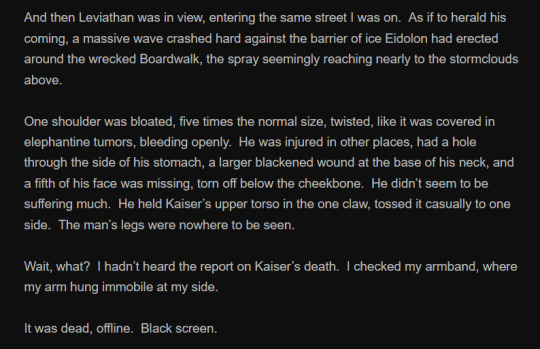
WOOOOOOO NAZI DOWN!

Hope the water slide chaps your legless ass on the way to Hell, Kaiser, you rancid fuck!
Also haha whoops I sure hope that dead armband isn't indicative of some kinda foul play

Well yeah, fuck, I guess it's a good thing she had those decoys after all

Credit where credit is due, if it was possible to actually kill an Endbringer, which I fucking doubt, this would probably be the best show of doing it.

According to Wikipedia, "hubris" describes a personality quality of extreme or excessive pride or dangerous overconfidence and complacency, often in combination with (or synonymous with) arrogance.

According to studies, hubris, arrogance, and pretension are related to the need for victory (even if it does not always mean winning) instead of reconciliation, which "friendly" groups might promote. Hubris is usually perceived as a characteristic of an individual rather than a group, although the group the offender belongs to may suffer collateral consequences from wrongful acts. Hubris often indicates a loss of contact with reality and an overestimation of one's own competence, accomplishments, or capabilities. The adjectival form of the noun hubris/hybris is hubristic/hybristic.
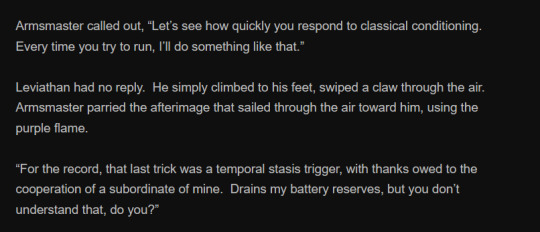
The term hubris originated in Ancient Greek, where it had several different meanings depending on the context. In legal usage, it meant assault or sexual crimes and theft of public property, and in religious usage it meant emulation of divinity or transgression against a god.
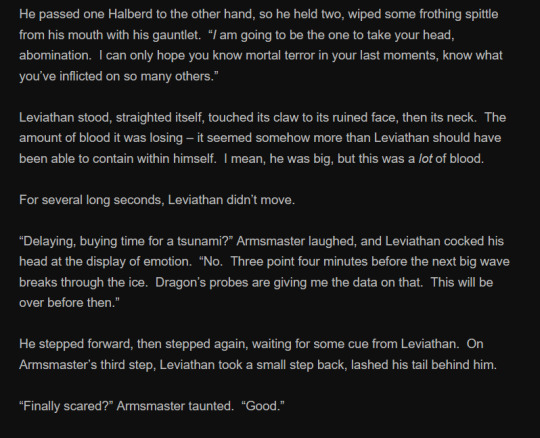
Hesiod and Aeschylus used the word "hubris" to describe transgressions against the gods. A common way that hubris was committed was when a mortal claimed to be better than a god in a particular skill or attribute. Claims like these were rarely left unpunished, and so Arachne, a talented young weaver, was transformed into a spider when she said that her skills exceeded those of the goddess Athena, even though her claim was true. Additional examples include Icarus, Phaethon, Salmoneus, Niobe, Cassiopeia, Tantalus, and Tereus.

These events were not limited to myth, and certain figures in history were considered to have been punished for committing hubris through their arrogance. One such person was king Xerxes as portrayed in Aeschylus's play The Persians, and who allegedly threw chains to bind the Hellespont sea as punishment for daring to destroy his fleet.
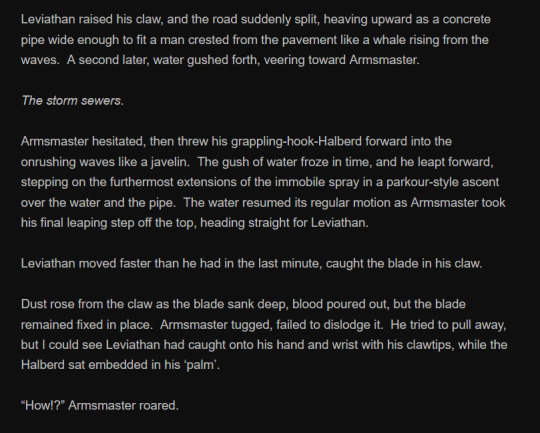
What is common in all of these examples is the breaching of limits, as the Greeks believed that the Fates (Μοῖραι) had assigned each being with a particular area of freedom, an area that even the gods could not breach

In its modern usage, hubris denotes overconfident pride combined with arrogance. Hubris is also referred to as "pride that blinds" because it often causes a committer of hubris to act in foolish ways that belie common sense.
Anyway I guess Armsmaster has to be called Armmaster now, s- oh, what's this?
Congratulations allwormdiet! You are the 4,000,000th Worm reader to make the "Armmaster joke!"
Oh boy what do I win
Nothing!
O-oh.

Tfw the teenager you deliberately attempted to sacrifice in order to get your moment of glory soloing the raid boss still tries to save your stupid ass

Fucking remarkable that Skitter is still contributing at all considering how hard she's been rocked through all of this
And she's gonna keep doing it, too.

Tfw the teenager you deliberately attempted to sacrifice in order to get your moment of glory soloing the raid boss is the only thing saving your life
Current Thoughts
Colin, Colin, Colin. We'll get into it more once the fight's over but you truly fumbled on this already rancid day. I hope like Hell this will finally get you to be a little humble.
So, some more bad losses in this chapter obviously, sad to see Aegis go for all he was kinda bland and I'm sure New Wave is going to feel their losses something fierce.
But hey, two more dead Nazi capes, so it's not all downsides!
42 notes
·
View notes
Text
HEY HEY UM. ARTISTS.
You know "Epic: The Musical"? And "Thunder Bringer" song ?
Take the line "pride is a damsel in distress" but interpret 'pride' as Hubris/Hybris . Like the god. Or common Greek falling , trope.
Okay, now take a character you like who has done something fucked up and wrong . Put them in the position of Odysseus , aka the subject of the song.
Perfect! Just like that! What... Pose? Do you use for Hubris? What pose should I use for Gambit? In a very particular AU .
I'm drawing some art. And need more ideas. There's no easy find full body image of hybris goddess. Any ideas Tumblr inas have for me. All good. Please share. Also if you take this concept with your own character ideas. Please show me. Thanks
Enjoying!
#-nubs#art#advice#epic the musical#epic the thunder saga#gambit#remy lebeau#please help#i need ideas#classic art#greek mythology#hybris#zeus#odysseus#the odyssey
28 notes
·
View notes
Text
Analyzing the Shadow Kings Part 5 - Pride
Woo hoo! Mild spoilers and I haven't read every appearance of this character.

Hybris get his name directly from Hybris the Greek personification of insolence. This lesser known goddess is also where we get the word hubris which is used to describe someone with excessive pride.

Hybris is a large bat furry with white skin, dark fur around his head and in other locations, and two wings. He is dressed ornately covered in gold jewelry, holding a fancy gold and black cane, he has a tattered red ribbon , and while he doesn't have a shirt he wears loose pants with a loincloth covering his privates.
Notably he has flat nose like some bats, sharp yellow nails on his hands and feet, four ears, his eyes have yellow iris with red sclera, he also has a third eye on his forehead. He has wrinkles around his eyes and markings reminiscent of eyeliner as well.
I don't know why Hybris is a bat. The other Amberdon gods and have an obvious Egyptian mythology connection. He could be based off Camazotz from Mesoamerican mythology as he is depicted as a leaf nosed bat (and is arguably the most famous bat related deity). OR he could have references to the Minyades of greek myth who went mad during a dionysion revel and at the end of the myth get turned into bats. I only bring up the Minyades because the myth is similar to how Hybris acts after Jalam activates the vessel of mimicry.
Hybris is usually very snide and manipulative to those around him. He is very patronizing often giving overly excited or backhanded compliments. Hybris will also switch to being a lecherous old man at the drop of a hat doing things like flashing people and describing what he wants in explicit detail.
Hybris breaks a tradition of the shadow kings by first appearing in the final episode of the previous chapter instead of the middle of chapter 5. He appears before Elaine protecting her from mummies before revealing he manipulated her into betraying her friends under the false promise of saving her father. Getting the empty vessel from Elaine.
For the rest of the chapter he takes a backseat to Jalam and Zacharoff subtly manipulating the pair. If you don't look at the "nsfw" scenes involving Zacharoff you instead get Hybris speaking to the king.
Hybris's plan was to copy the empty vessel and using that copy to ascend either Jalam or Zacharoff into true godhood. From there the demon would buy his time until he could steal the throne of god from them for himself.
His plan failed when Gaia finally transformed into a full fledged dragon god himself, and defeated Zacharoff. In a pretty vindicating scene for me Jalam finally does something right and shuts Hybris up after the shadow king starts belittling Zacharoff for his loss.
Hybris doesn't change all that much after chapter 5 he still follows Jalam and Zacharoff around making snide or perverted comments. I feel what changes more is that the other characters don't really listen to him as much so he has less influence as a whole.
I have a huge blind spot for Amberdon characters (Elaine and Zacharoff are two of my favs). So I do have a built in blind spot for this shitty old man. He fills the niche of bitchy old queen so well it would be so fun to just heckle things with the guy.
8 notes
·
View notes
Text
Name: Erebus Skotos
Age: Eternal
Backstory: I was the first to exist, I shall be the last
I am Tartarus! I'm also eternal!
My numerous children roam the realms, aren't they wonderful?
Me and Nyx's many children (TBD)
Lucifer (Complex title, Adopted by Nyx) @lucifermorningstar-official
Tsukoyomi-no-mikoto (Kami of Darkness, Adopted by Erebus) @tsukoyomi-no-mikoto
Oizys (Pain, Despair, Woe and Suffering) @og-aaaaaaaaaa
Momus (Complaint, Mockery and Trickery) @best-trickster-god
Geras (Old age) @ye-olde-geras
Moros (Doom) @moros-doom
Thanatos (Death) @a-death-so-very-gentle
Hypnos (Sleep) @hypnos-sleepy-boy
Eris (Discord) @the-goddess-of-chaos-eris
Nemesis (Justice) @justice-bringer
Elpis (Hope) @hope-herself
Hemera (Day) {To be added}
Aether (Light) {Don't know any}
Achlys (Death mist) @keres-1
Ker (Violent death) @keres-2
Tenebrae (Darkness around death) @keres-3
Clotho (Spinner of fate) @og-spinner
Lachesis (Alloter of fate) @og-alloter
Atropos (Ender of fate) @og-cutter
Apate (Deceit) @apate-fraus
Megaera (Grudging)
Tisiphone (Avenging)
Alecto (Unending)
Charon (Boatman) @boatman-of-the-dead
Styx (The river Styx) @stygian-rivers
Philotes (Friendship) @the-first-friend
Veritas (Truth) @true-truth
Sophrosyne (Self restraint) @sophrosyne-goddess
Epiphron (Shrewdness)
Hybris (Hubris)
The Charities
Eleos (Mercy) @eleos-the-forgiving-goddess
Ponos
Penthos
Limos
Polemos
Amor (Love)
Eve @onlymythologypersonincamp
Skotádi @morker-kid
αστεριού @random-child-of-nyx
{Btw if you want to be added or removed or replaced, let me know}
14 notes
·
View notes
Text
here, take my stupid epic and myth designs..

(ignore that they’re all headshots, i’m just jotting down designs 😭😭)









1 - epic poseidon design
2 - myth perseus design
3 - epic hermes design ideas
4+5 - myth hybris & ate designs
6 - epic and epic au eurylochus design ideas
7+8 - myth dionysus & persephone designs
9+10 - myth artemis design
#greek mythology#epic the musical#drawing#eurylochus#epic au#epic: the musical#greek myth#hybris#artemis#goddess ate#dionysus#persephone#perseus#epic poseidon#epic hermes#hermes#doodles#yes i gave perseus a rooster feather necklace..#artemis’ hood premise is sooo funny to me
36 notes
·
View notes
Text
"Pride before downfall" Asteroids in astrology
by : Brielledoesastrology (tumblr)
"Don't fly too close to the sun"



asteroid Icarus (1566), asteroid phaeton (3200), asteroid hybris (430), niobe (71)
1566,3200,430,71
Icarus (1566) -
Daedalus, a mythical inventor, created wings made of feathers and wax to escape from Crete where he and his son Icarus, were held captive by King Minos. Icarus however ignored his father's warnings and flew too close to the sun. His wings melted and he fell into the sea where he met his end.
Source : thecollector.com
.
Phaeton (3200) -
Phaethon asked to be allowed to drive the chariot of the sun through the heavens for a single day. Helios, bound by his oath, had to let him make the attempt. Phaethon set off but was entirely unable to control the horses of the sun chariot, which came too near to the earth and began to scorch it. To prevent further damage, zeus hurled a thunderbolt at Phaethon, who fell to the earth at the mouth of the Eridanus, a river later identified as the Po.
Source : britannica.com
.
Hybris (430) - "Hubris"
HYBRIS was the goddess or personified spirit (daimona) of insolence, hubris, violence, reckless pride, arrogance and outrageous behaviour in general.
Source : www.theoi.com
.
Niobe (71) -
Niobe was a mortal who boasted of her many children, incurring the wrath of the gods. As punishment for her pride, Apollo and Artemis killed all her children, shooting them with arrows.
⚠️ Warning : i consider this asteroid as prominent or brings the most effect if it conjuncts ur personal planets (sun,moon,venus,mercury,mars) and if it conjuncts ur personal points (ac,dc,ic,mc), i use 0 - 2.5 orbs (for conjunctions). For sextile, trine, opposite and square aspects to asteroids i usually use 0 - 2 orbs. Yes tight conjunctions of planet / personal points to asteroids tends to give the most effect, but other aspects (sextile,trine,square,opposite, etc) still exist, even they produce effects. If it doesn't aspect any of your planets or personal points, check the house placement of the asteroid, maybe some stuff/topics relating to this asteroid could affect some topics/stuff relating to the house placement . ⚠️
#astrology#astro observations#astro notes#astrology observations#astro community#astrology notes#zodiac#astroblr#gemini#aquarius#astrology blogs#astrology community#vedic astro community#vedic notes#brielledoesastrology#asteroids in astrology#asteroids astrology#astrology asteroids#asteroids astrology observation#icarus#phaethon#asteroid icarus#asteroid phaethon#fame in astrology#pride before downfall
106 notes
·
View notes
Note
Do you have any ideas for a Flipped Personality Pyrrha? Like how we worked on Flipped Yue, Bluby, and Aiko? The best I got right now is a purple color scheme.
Purple is a good start I think, or just blue even though that is Ruby’s flipped color as well. I think Purple could be a nice unique color to her, at least for her hair.
I looked up what the “opposites” for bronze would be, and this Steel blue popped up, ask well as this sort of purple for the opposite of a brownish color. Then maybe have silver or regular gray steel for her armor, circlet, and necklace instead of gold? And should we change her eye color as well like with Bleiss having red eyes instead of lilac?
Okay so here's what I am thinking are some strong points:
She has hair like the red-violet color hair like in the first pic
Her bronze and brown corset is now steel blue and the purple in the third pic
Her golden accessories (circlet, necklace, and armor) are now silver instead
Blue eye shadow perhaps?



As for flipped Pyrrha’s actual personality itself, I do have some ideas as well:
She is much more arrogant and acts more entitled than regular Pyrrha, fame from being the "Invincible Girl" having long since gotten to her head.
She believes that she is actually better than a lot of people and loves the attention she gets from her fame. This can make her kind of difficult to work with
She show less restraint when fighting and barely any sportsmanship when she thrashes her opponents, gloating in her victory
She's also much more bold and free spoken with people, not too concerned with what people think of doing so because she's the Invincible Girl so therefore her opinion matters most. She'll outright tell someone that they're annoying her or that their ideas are stupid
She's a huntress more to keep proving herself as the strongest rather than to actually help people
Now for her name. On the RWBY wiki it says that "Pyrrha Nikos's "first and last name together are a reference to a Pyrrhic victory, a tactical victory that comes at such extreme cost it is often seen as a strategic defeat" and that ""Pyrrha" is derived from the Greek adjective pyrrhos (πυρρός), which means "flame-colored". Nikos (Νίκος), meaning "victor of the people", is derived from Nike, the Greek Goddess of Victory." So perhaps something else since her hair color is different that "Flame-colored" now and is purple instead as well as a different last name as well to fit her more arrogant nature?
Now, "According to the Merriam-Webster Dictionary, the word “purple” is derived from the Greek porphyra or porphyrous, a seldom used adjective describing “someone that has a purple color.”" and her last name could have to do with hubris, derived from the greek word hybris who was a spirit (daemon) of insolence, violence, and outrageous behavior. Also hubris basically means arrogance, which would fit this flipped version of pyrrha nicely
Here are three name ideas for her that I have from most favorite to least favorite:
Phyra Hybos
Porphyra Hybros
Porpyra Hybos
Super subtle, I know. Or maybe a different combination or alteration of these, but Phyra Hybos is honestly my favorite because it's similar enough and different enough to Pyrrha Nikos in my opinion. So that will be the name I work with for now unless enough people like something else.
Also, I imagine she'd still be interested in Jaune, but for different reasons than normal. Whereas Pyrrha starts paying attention to Jaune because she's like "oh wow he doesn't treat me like a superstar because he doesn't know who I am! Yay!", Phyra Hybos was more like “How the fuck does he not know who I am?!?!” and after having a small freak out do to that, she sets her mind on showing him just who and how amazing she is.
#rwby#pyrrha nikos#phyra hybos#reverse personality#reverse character#opposite personality#opposite character#flipped personality#flipped character#personal opinion#personal ask#ask#sfw#lonesilverw0lf#pic
24 notes
·
View notes
Text
Cyrus, Katerina, Campbell
First impressions after re-reading DGM Some theories and observations Notes on Link, part 1 & part 2
Have a nice week-end!!
Again I'm sorry for the awkward english!!!!
(SPOILERS UP TO CH247!!!!)
▶ « Cyrus » and Cross
After focusing on Skulls and Link’s names, I wondered if there was something for Cross and Katerina, two enigmatic characters!
In volume 24, サイラス (‘Sairasu’), which is localized as Cyrus in the English translation, Mana and Neah’s ‘uncle’, is mentioned. This could add to the ‘Cross = Cyrus’ theory:
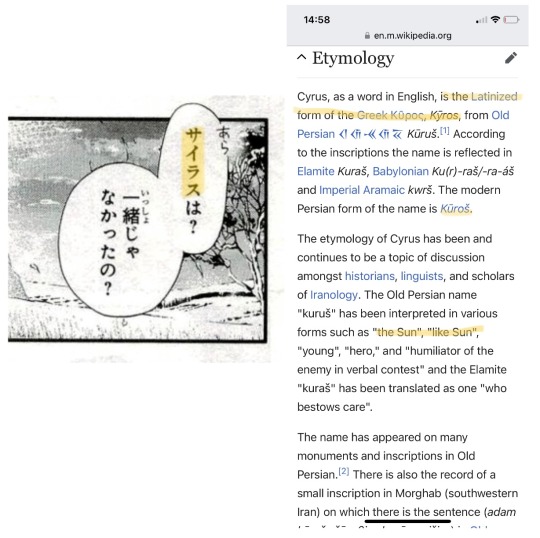
Cross’s name in Japanese is クロス, which is pronounced ‘Kurosu’. The ancient greek form of Cyrus is Κῦρος, pronounced ‘kuros’ (like how you would pronounce ‘hybris’).
Is Cross the name Cyrus adopted after whatever happened at the Campbell mansion (and also, a symbol of the heavy cross he has to bear for Mana, Neah and Katerina)? Though it’s interesting to note Neah calls him Cross in ch215.
Now in the French translation, his name is localized as ‘Silas’, and the Japanese prononciation could lead to both localizations so I don’t really know if this holds any meaning!
▶ « Katerina »
Katerina is a variant of the name Catherine.
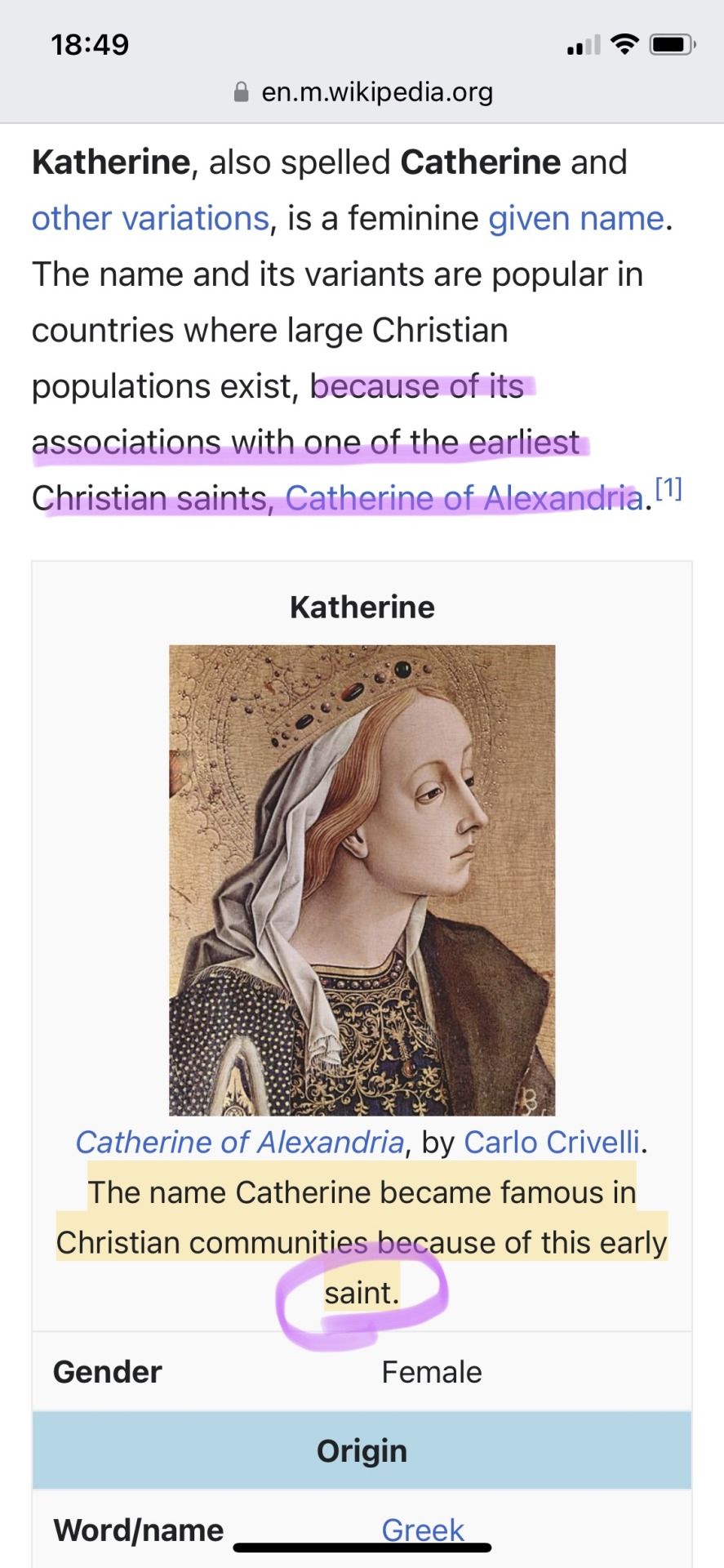
The name became attached to the ancient greek adjective καθαρός, ‘pure’. Also, « Marian Cross » might be a reference to a kind of religious cross:
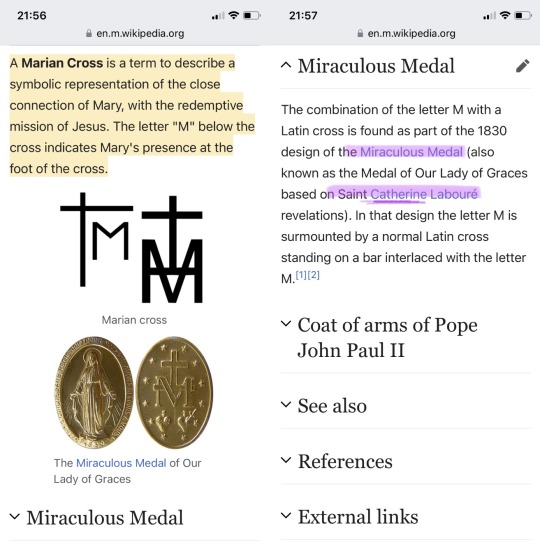
A SAINT, you say....................

A side note: on the miraculous medal, there were twelve stars, symbolizing the twelve tribes of Israel and the apostles. There are two hearts on the medal. One heart bears a crown of thorns — the Christ’s Sacred Heart —, the other is stabbed by a knife — the Immaculate Heart of Mary —. Joined together, the two of them represent the Christ and Mary’s love of the world.
I don’t know if it’s relevant or not, but in ch121, Lavi managed to get out of Road’s dream by stabbing Allen’s illusion in the heart, which ends up piercing through Road’s own heart. And volume 13’s cover features a colorful focus on Lavi and the knife spilling blood in the foreground, which contrast with Cross, two crosses and the coffins coloring the background.

Not to mention:
1) Grave of Maria accompanying Cross: her dress is adorned with roses which are associated to Mary, sometimes represented with a rose crown (the rosary also originates from them). The ‘saint’ from Luberrier’s family is drawn wearing a (presumably) white rose, symbol of purity, innocence and devotion. The black ribbon that covers Maria's head ends up in a butterfly-shaped bow. In christianity, butterflies symbolize rebirth after death like the Christ’s spirit. Though rare, Mary has been represented with butterflies (I also saw that butterfly in spanish is 'mariposa' and its etymology was sometimes supposedly linked to Mary, I wish I could read in spanish ;;).
2) The association of Maria to what looks like a memory of Katerina:
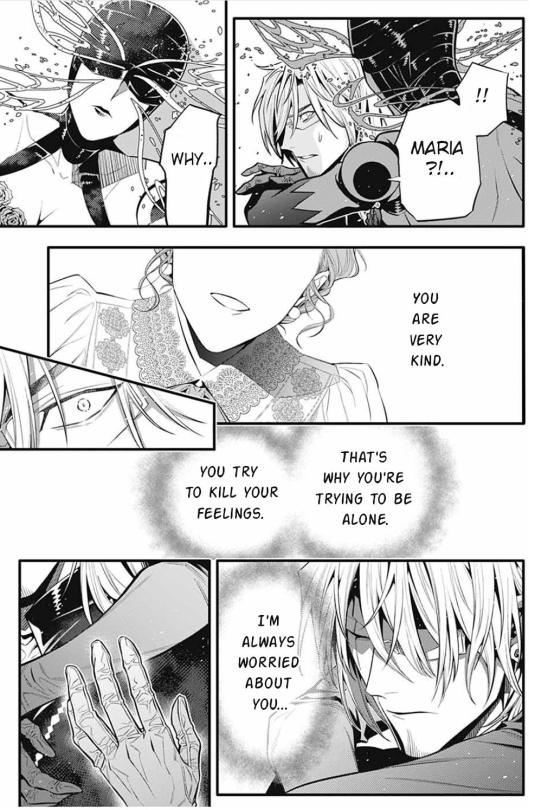
3) In volume 13, Allen says Maria is the corpse of a parasite-type accommodator that is now controlled by Cross’s magic. Though it’s a forbidden spell, he was granted an extraordinary permission from the Order.
On the other hand, Cross suggested that Allen searches for Katerina in the mansion. This leads to the belief that she's pretty much alive, so perhaps Maria and Katerina are unrelated and Cross just remembered Katerina because the two are similar in personality. Their association is really tempting, though.
Especially since her whole face is concealed by her ribbon and we were recently given this page linking the two together!
Or who knows, maybe her soul got separated from her corpse or some other magic happened? We know so little so anything could happen!
It's a great stretch in all this, but Katerina’s name origin has also been linked to Hekate, a goddess of, among other things, liminality between spaces/worlds (entrances, exits, city walls, doors, gates, boundaries and crossroads, the living and dead realms ; one of her epithets was Enodia, ‘she of the road’), the underworld (she was considered the guardian of Hades’s keys, served as a guide), witchcraft (eg. in greek tragedies) and the night. Throughout history, she was also sometimes confounded with other divinities eg. Demeter, Artemis, Persephone. The dog was one of her sacred animals (represented accompanying her and also her sacrifice).
She wasn’t originally associated to the moon, but it became one of her main attributes with witchcraft later, as well as ghosts. In wicca, she is related to the Triple Goddess, which is associated to the archetypes of life (birth, death, rebirth), the Maiden, the Mother and the Crone or the moons (waxing, full and waning).
She was also later said to have a great knowledge of plants, especially to make poison.
The story uses these symbols a lot. The symbol of liminality especially reminds me of Road. (Of course I don’t believe there must be a correlation, references can just be references for the sake of it and highlight meanings, but the research was very fun!)

▶ « Campbell »

A CROOKED mouth…...... ? It’s THE telltale characteristic of the Noah’s memory, while Noah’s physical appearance features golden pupils and stigmata!
Now I don’t know where the story is headed with the Campbells, but I’m really curious to learn more, especially their link to Mana, Neah and the Noah!
72 notes
·
View notes
Note
👥 + Eurydice?
Yes yes yes lemme talk about the questmates of hers (the reason she was in the Lotus Casino)
Donovan Barclay ; son of Hybris, the goddess of insolence, violence, and reckless pride and that suits him perfectly. He was the quest leader, though Eurydice was taking more control since he kept being reckless, and it was his idea for the group to trick her into the casino and continue the quest without her. Boyfriend of Penelope and his fate is [REDACTED]

Penelope Winchell ; daughter of Tyche, the goddess of luck and fortune. She's very competitive and has wanted to go on a quest since she arrived at camp when she was 11. She was the most outwardly rude to Eurydice but they were able to seem cordial during the first part of the quest, up until Eurydice entered the casino that is. Girlfriend of Donovan and her fate is [REDACTED]

Cillian Ogawa ; son of Oizys, the goddess of misery. He tried to combat that and be as nice as possible to people but still didn't have many friends at camp. He was the friendliest with Eurydice since she was always nice to him and was the least willing with Donovan's plan, but he did still go with it. His fate is [REDACTED]

Send me 👥 + an oc and I’ll tell you about an oc side character in their story
2 notes
·
View notes
Text
Character Intro: Enyo (Kingdom of Ichor)


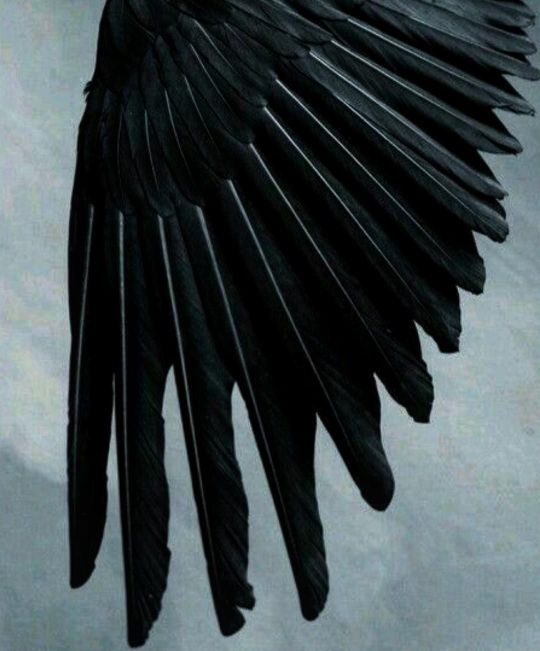







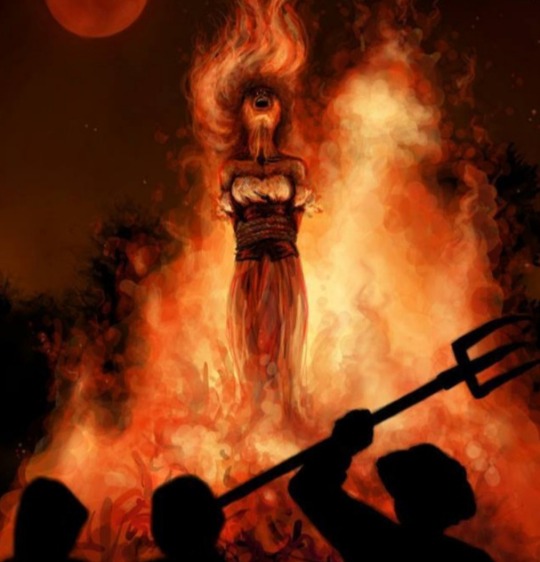




Nicknames- The Bloody Goddess by the people of Olympius
Vicious E by Ares
Bullet Babe by Zeus
Age- 39 (immortal)
Location- Little Sparta, New Olympus
Personality- An ultimate bad-ass, she's well known in the pantheon for her short temper! She's unapologetically brutal, harsh, & unforgiving. Positively, she's fiercely determined and passionate. She's recently married.
She has the standard abilities of a goddess. As the goddess of war, destruction, bloodlust, & devastation her powers/abilities include pyrokinesis (her fire burns a bright red), limited geokinesis (can cause earthquakes- not to the level of Poseidon), odikinesis (manipulating the feelings of rage, anger, & violence in others), flight (due to her black swan like wings), telumkinesis, being able to communicate with/shapeshift into her sacred animal- the swan, haemokinesis (blood manipulation), and summoning weapons out of thin air.
Enyo's main abode with her husband is the top floor of The Stratios, a luxury high rise apartment building in the Little Sparta neigborhood of New Olympus. They also own a mansion estate in Sparta & are thinking about getting a beach house in Themiscyra. Inside the apartment, the ceilings and walls are made out of pure bloodstone while the floors are a flawless black marble. There are lots of metal & leather furniture with many decorative pieces of armor, helmets, and weapons lining the walls. There's a separate war room as well as a room that's filled with a wide arsenal of various weapons. When Enyo is not in the mood to use her wings, she gets around in her sleek black sports car. She has two pets- twin dragons (a boy & girl) named Bellum and Bellona. Their bright crimson & silver scales are often complimented on!
A go-to drink for her is a cranberry martini. She also likes red hot shots, bloody marys, mulled wine, beer, negronis, manhattans, red wine, dark cherry cola, & black raven cocktails. Her usuals from The Roasted Bean are the large cranberry cherry spalsh and olympian sized roast coffee (with a bit of sugar).
Enyo starts off her mornings with a super intense cardio workout along with a session of kickboxing at the gym. She then goes to the spa for a session of acupuncture.
She loves steak & eggs for breakfast, putting way too much inferno hot sauce on top! She likes her bacon extra crispy and nearly burnt & she also likes when her husband makes his eggplant-ground pork stuffed steamed buns.
Enyo surprisingly has her own glamour doll collectible!
One notable moment in her godly career was when she awarded the gold medal to a giantess named Atonia at the Olympic Tournament who broke the record for the javelin throw!
A favorite sweet treat of hers is chocolate cherry ice cream.
Enyo is well versed in many fighting styles including mixed martial arts, capoeira, kyusho jitsu (pressure point martial arts), muay thai, and pankration!
She once almost came to blows with Themis (Titaness of justice) after she rendered a verdict in a court case where Enyo was in attendance.
In the pantheon she's friends with Aegaeon (god of sea storms), Hysminai (goddess of fighting & combat), Gymnasia (goddess of excercise & gymnastics), Philotes (goddess of sex, friendship, & affection), Dyssebeia (goddess of ungodliness & impiety), Proioxis (goddess of attack, onrush, & battlefield pursuit), Dione, Adikia (goddess of injustice & wrongdoing), Kéfi (goddess of mirth), Atë (goddess of mischief, ruin, blind folly, delusion, & downfall of heroes), Androktasia (Andi) (goddess of battlefield slaughter), Hybris (goddess of insolence, hubris, & reckless pride), Lycana (Titaness of lycanthropy), Perses (Titan god of destruction), Menoetius (Titan god of anger, violence, & rash actions), Poena (goddess of punishment), Alastor (god of blood feuds & vengeance), Felis (Titaness of cats), and Kakia (goddess of vice & moral wrongdoing).
Enyo doesn't mind Athena (goddess of wisdom) and has on more than one occasion been impressed with her.
Outside the pantheon, she has friends who are Giants & Amazonians.
Enyo has been a mentor twice- to Lyssa (goddess of rage & frenzy) and Eris (goddess of strife & discord).
She loves getting the spicy BBQ rib sandwich from The Bread Box.
Enyo recently got married to her husband Polemos (god of the war cry) three months ago on a private beach in Sparta (this particular beach is known for its black sand). They first met a year ago during construction of the Thereitas military base in the city. To say their chemistry was instantaneous is an understatement! Perses jokingly remarked that the initial meeting was akin to "a bomb meeting a stick of dynamite." They couldn't keep their hands off each other during photos at the grand opening of the 2nd largest military base in New Olympus. A week after his divorce from Ioke (goddess of pursuit, tumult, & battle rout) was finalized, Polemos proposed to Enyo with a yellow gold band custom oval cut rhodolite garnet ring surrounded with yellow canary diamonds, rubies, & white diamonds. Her wedding dress was far from traditional (garnering an audible gasp from Hera)- a backless curve hugging sheer black dress with a corset bodice and tulle sheer skirt.
She loves the Olmorfia matte lipstick in "Carnivorous", a dark red color.
Enyo has a good relationship with her step-daughter Alala (goddess of war cry). When Alala visits they'll go shopping, check out the latest action movie at the cinema, & go to the gun range.
A guilty pleasure of hers are olympian sized cajun fries from Olympic Chef!
Her main job is overseeing the Thereitas military base with her husband. For other sources of income, she models for/endorses Delicious Xtasy, Megaleio, & atelier fantaisie. She also sometimes writes for The Oracle newspaper and O Dianooumenos.
Enyo is also a professional wrestler! Her stage name is Black Widow & some of her signature moves include the riptide, pop-up body toss, prism trap, stalling suplex, & full nelson slam. There's excited and frightened buzz about an upcoming match between her & the cyclops Maneater.
She once knocked a mortal guy out cold when her tried grabbing her ass while she was walking with Alala.
One of her favorite gifts she Enyo ever got was the white gold bloodstone & onyx charm bracelet from her husband.
Kéfi gave her a swan shaped jeweled clutch from Diamond Ave. for Christmas.
Her & her husband are HUGE basketball fanatics! When watching games, they always rep for their favorite team- the Sparta Spears!
Some of Enyo's favorite foods include sausage & pepper skewers, feijoada with white rice, baião de dois, steak (well done) smothered in onions, lamb souvlaki, & moussaka.
In her free time she enjoys working out, sword fighting, boxing, mountain climbing, basketball, riding on dragonback, volleyball, archery, cliff diving, baseball, volcano boarding, clubbing, and lava surfing.
"I don't know of any lesser evil than war."
#my oc#oc character#my character#my oc character#enyo#oc intro#character intro#oc introduction#character introduction#modern greek gods#modern greek mythology#greek myth retellings#greek goddess#greek goddesses#greek mythology#greek pantheon#greek myths
11 notes
·
View notes